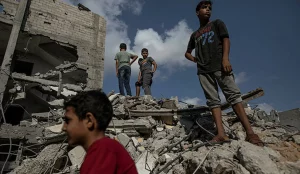Gazans Are Tired of Pointless Wars and Destruction, and Hamas Listens to Them

Palestinians search through the rubble of a building in which Khaled Mansour, a top Islamic Jihad militant was killed following an Israeli airstrike in Rafah, southern Gaza strip, on Sunday.
It is difficult, even impudent, to phone people in Gaza and ask whether they support the Islamic Jihad’s decision to launch a barrage of rockets into Israel after the killing of senior military commander Taysir al-Jaabari and his aide, Salame Abed. Why difficult? First, technical reasons: Absent shelters, iron domes and sirens, some two million residents in the Strip are again experiencing the Russian roulette they have endured since 2008 across four wars and countless smaller military “operations.” They are busy worrying about their own lives and those of their kin and loved ones, and they are afraid and unable to stop themselves from imagining the worst. They suppress the terror with catnaps and with chitchat about anything other than the current war.
They are busy finding out who of their relatives in Jabaliya or Rafah has been killed, and how their friends living next to the just-bombed building are doing. They exchange information and gruesome videos of a hand sticking out of the rubble, children screaming, women fleeing and houses folding into clouds of smoke and ashes. Gaza is small and compact, and it seems that everyone knows everyone and is afraid for everyone.
And why is it impudent to ask Gazans if they supported the Islamic Jihad’s response? Because this is a question that implies the very Israeli assumption that “the Palestinians started it again,” and that this is an evenly balanced situation between two sovereign entities, with one (Gaza) warmongering and attacking the peace-seeking country. This is a question that fails to take into account that Israel continues to dictate the lives of Palestinians in the Strip, as it does in the West Bank, even if it claims that it does not, and even if most Israeli Jews don’t believe it.
When it chose to embark on the allegedly terror-attack-preventing assassination, Israel gambled that the Islamic Jihad would act according to the script it had written. Meaning that Israel deliberately returned the residents of the Gaza perimeter to the circle of fear from rockets, sirens, and the sound of interceptions. When the Islamic Jihad acted according to Israel’s script, it should have taken into account that Israel would not content itself with one round of initiation and response. In other words, it must have considered that Israel would repeatedly launch “surgical” airstrikes that also kill and wound unarmed, non-combatant Palestinian citizens, strikes that cause enormous property damage and bring two million besieged people back to a world of deathly terror and mortal peril.
Hamas, as the de-facto government in Gaza, isn’t going anywhere. It seeks to one day lead the entire Palestinian people under Israeli control and in the diaspora instead of the PLO and Fatah, who have been emptied of all content.
As a ruling party, Hamas’leaders must have come across the survey conducted by the organization Save The Children, published in June under the title “Trapped.” The survey shows that after 15 years of the Israel-imposed siege, the widespread unemployment and poverty caused by it and by four large-scale military conflicts, four of five children in the Gaza Strip, a full 80 percent, suffer from depression and live in fear and grief.
In the organization’s previous such survey, in 2018, the rate was 55 percent. Bed-wetting, refusal to talk, inability to find positive ways of coping with hardships, a sense that family and friends are unsupportive, and attention deficit, are but some of the unsurprising psychological symptoms noted in the report, which most children suffer from. Other findings were that over half of all children in the Strip think of suicide, and three in five of self-harm.
Alms from Qatar and military bravado won’t solve this distress. Even if Hamas has a tendency to doubt the accuracy of “Western” surveys that rely on “Western” psychological theories, it cannot completely ignore the data and its direct link to the wars. Israel and its citizens don’t care, nor do Western governments that speak of “Israel’s right to defend itself” while frustratingly ignoring its control over the Strip. Who, if not the de facto government of the strip, should come to the conclusion that expanding the current military clash is bad for its own people?
This article is published in its entirety
